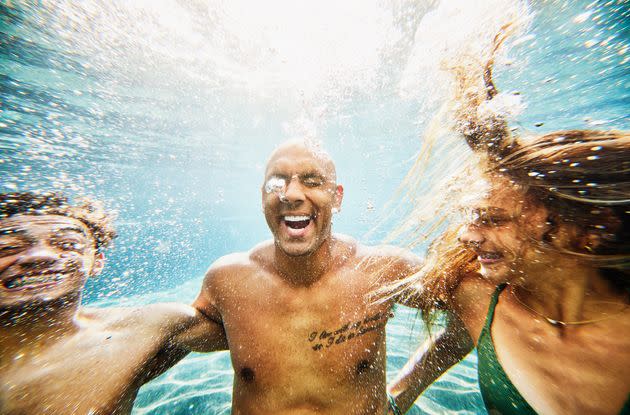PSA: Summer Can Be The Most Dangerous Time Of Year For Your Eyes

Summer is time for peak relaxation mode. But you might not want to get too relaxed ― at least when it comes to eye safety.
Some of the most enjoyable aspects of the sunny season ― the breeze, the waves, the intoxicating blend of sunscreen and frozen cocktails, the sun itself ― all have the potential to wreak havoc on our eyes if we don’t take protective measures.
Here are the biggest risk factors and mistakes eye experts see people experiencing in the summer:
Focusing on fashionable rather than protective sunglasses.
Sun damage is the most pressing and obvious culprit of the bunch. Leaving eyes unprotected can lead to such eye issues as cataracts, retinal disease and even eye cancers.
That’s why Dr. Nicole Bajic, an ophthalmologist at the Cleveland Clinic, recommends seeking sunglasses with 100 percent UV protection, or UV 400, to protect against damaging UVA and UVB rays.
“What’s interesting is the cost of sunglasses doesn’t correlate with effectiveness,” she told HuffPost. “You can have cheap sunglasses that have proper UV protection. You just have to make sure it’s designated on the label. UV protection is not that expensive to add; in fact, sometimes the designer sunglasses will have less protection. You have to look at the label.”
While the price tag isn’t necessarily the best indicator of how effective a pair of sunglasses will be, there are a few other things to consider when picking a pair. Though the fashion industry would like us to believe otherwise, the colored lens trend is not your best bet when it comes to protection.
“The brighter colors are not good,” Robert Messinger, a recently retired New Jersey-based optometrist, told HuffPost. “They don’t offer adequate protection and let too much light in.”
The issue is that when you cover your eyes with any form of protection, your pupils think you’re inside, so they expand. When the coverage is insufficient, the combination of enlarged pupils with more light coming in puts your eyes at risk for damage.
For those whose summer hearts are set on making a stylish statement, Messinger recommends saving those colorful lenses for the evening hours or indoors ― unless they’re green. Gray or green G-15 lenses, like the ones used on many classic Ray-Bans, are some of the most effective for sun protection, Messinger said.
Not checking your eye drops before using them.
Whether it’s dehydration, allergies, alcohol consumption, accidental overzealous sunscreen application or a pesky beach neighbor shaking out their towel in your face, many factors that cause eye redness, itchiness or dryness can be remedied with artificial tears, which have a long shelf life that will last you all summer.
But both Bajic and Messinger agree that when it comes to finding the right ones, it’s not the time to cut corners.
“There have been some issues with artificial tears,” Messinger said, pointing to the recent recalls of certain store-bought eye drops that led to bacterial infections, vision issues and blindness in some consumers. Last year, the Food and Drug Administration found that “[un]sanitary conditions in the manufacturing facilities” contributed to contamination of the products.
But don’t panic ― Bajic said the FDA keeps updated reports about the brands that have been recalled, and when you find the right ones, you can use them as many times as it feels necessary to flush the eye out. You can also get an approved brand or prescription through your eye care provider.
“We recommend they get used up to four times per day, but you can switch to preservative-free versions, which you can use up to 10 times per day,” Bajic said.
Additionally, you’ll want to make sure your eye drops aren’t expired, or you’re not using a bottle that has come into contact with your eyes during an infection. Some eye drops should even be discarded a number of days after opening or if you’ve used them during an infection. (For example, preservative-free versions have a much higher risk of contamination after use and may need to be tossed 24 hours after opening them, according to the American Academy of Opthalmology.) Be sure to check the label before using them.

Fireworks. Just ... fireworks.
One of the most potentially damaging activities for your eyes is more likely to occur once the sun goes down.
“We’re coming close to July 4th, that is the worst day of the year for all ophthalmologists,” Bajic said. “We see a lot of trauma on that day, especially with little ones, but just everyone ― if you’re using sparklers, fireworks, wear eye protection. One of the biggest ways we see trauma is when people are using them after they’ve been drinking and they’re not following safety precautions. Especially if they think it’s a dud, they’ll think it didn’t go off and look down the barrel.”
Bajic said ideally you’d avoid firework use completely, but if you’re going to do it, do not look down the barrel. “I can’t even be around champagne corks popping now; I look away and shield my eyes. I’ve seen too much.”
Wearing contacts when swimming.
Eye safety is crucial when it comes to swimming, especially if you wear contact lenses. Both Messinger and Bajic say you should never go swimming with contact lenses in.
“Contact lenses are sponges; they soak up everything,” Messinger said. “In the pool, obviously, you have chlorine ― you don’t want to have that in your eyes all day. But in the ocean or other bodies of water, you have bugs. Your body has a mechanism to flush and clean things out, but with contacts, you’re holding those things in the eyes for a much longer period of time.”
That provides a perfect set up for horrible, vision-threatening bacterial infections, Bajic said. The one exception, she said, is if you wear daily lenses and throw them out immediately following your swim.
If you experience eye pain or irritation that does not go away after flushing your eyes out with water or artificial tears, Messenger and Bajic advise paying a visit to your eye doctor as opposed to seeking care elsewhere.
“Any time you have eye pain that is significant, or getting worse, make sure to go see your local eye doctor,” Bajic said. “People will go to the ER or urgent care, and they’re fantastic, but they don’t have the type of equipment we have in eye clinics. We can see what’s going on in very fine detail.”

